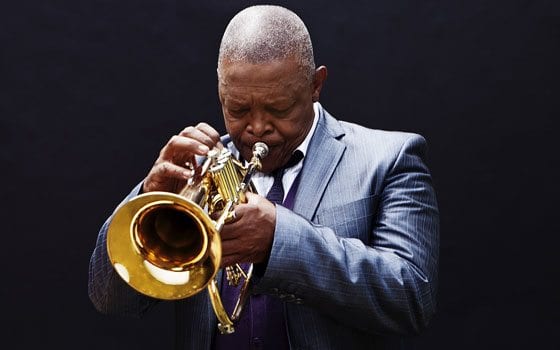

Author: Eric AntoniouRetiring band director Tom Everett and Don Braden (‘85) at the Sanders Theatre on Saturday, April 13.
South African musician Hugh Masekela brought his irresistible vein of music to Boston Sunday night. The show at the Berklee Performance Center, a presentation of World Music/CRASHarts, soothed an audience still reeling from last week’s heartbreaking events.
Befitting a star of international stature, Masekela, 74, delivered a polished production. Performing more than two hours nonstop, he and his five-member ensemble played well-known selections from a repertoire honed over more than 40 years that melds the musical styles of his native South Africa with elements of American jazz, blues and rock.
While the music was familiar to his fans, the tightly produced show was a platform for stirring improvisation that made each song new and encompassed the audience with the strength of a resilient, jubilant musical tradition.
Coming up as a gifted young trumpeter in Johannesburg and Cape Town, Masekela joined Dollar Brand (later known as Abdullah Ibrahim) in the first African jazz group to record an LP. He absorbed the whirling township styles, particularly mbaqanga, a stew of Zulu vocal and dance traditions seasoned by bebop and Bo Diddley. Simmering in urban bars, the music became a voice of protest against oppressive apartheid policies.
In 1960, as censorship tightened, Masekela and other talented musicians left South Africa only to return in the ‘90s, after South Africa abolished its race laws. Arriving in New York in the ‘60s, Masekela told an interviewer, he met “the royalty of American music…Dizzy [Gillespie] introduced me to everybody. It was the golden age of music.”
Wearing a tent-shaped tan tunic over a green shirt and orange pants, Masekela first addressed the crowd with his flugelhorn, then added his baritone voice and soon, his whole body.
He presided with the bearing of an elder statesman and captivated the audience with humor and ageless energy. Constantly in motion, he danced with deep squats and demonstrated his prowess as a mime, evoking a bird or a monkey to accent a lyric. When not singing or playing his horn, he backed another’s solo by shaking a cabassa or beating an alo bell, at times doing three or more things at once.
Accompanying Masekela was his long-standing ensemble, who were all from South Africa except Sierra Leone percussionist Francis Manneh Fuster. He and bassist Abednigo “Fana” Zulu have played with Masekela for more than two decades. Masekela showed paternal pride for the three young musicians — lead guitarist Cameron John Ward, keyboardist Randal Skippers and drummer Lee-Roy Sauls.
With his ensemble providing tasty solos as well as backing vocals, Masekela began with the languages of his homeland, including Zulu, Tsonga, Sotho and an occasional tongue click of Xhosa.
He scatted assorted rasps and growls while Ward responded with sunny, swirling chords. In frequent rounds of give-and-take, Masekela issued forth rapid, short lines with his horn that Ward would transform into sweet, spiraling notes or a bluesy riff.
Masekela treated English as just one more vehicle for joyful self-expression. Urging the audience to join him, he led a call-and-response exchange with Zulu phrases. “Be yourselves,” he told the audience, until the volume and enthusiasm of everyone’s cries satisfied him that all were “healed and well.”
Masekela explored the visual and verbal pleasures of a Fela Kuti song, “Lady,” a song of praise to modern women in Nigerian pidgin, a slang version of English. While singing, he moved to the song’s easygoing rhythmic pace and mimicked the stride of a proud woman.
No stranger to the poetry of the English language, Masekela conjured an encounter with a lovely woman at a vegetable stall with his song, “Market Place.” “I won’t forget the day when the sun came shining,” he sang, describing a woman “floating through the market like a butterfly” with “corn-row hair in a million braids.”
Masekela performed his epic song “Stimela,” which renders the plight of his country’s conscripted mine workers by portraying the train that brings them to towns where they work “16 hours a day for almost no pay.” He punctuated the somber lyrics with the sounds of a train’s whistle, belching steam and chugging engine.
After immersing the audience in his infectious musical world, Masekela spoke directly of Boston’s tragic events. He expressed his condolences to the friends and families of the victims of the Boston Marathon bombing. He asked us to also remember “all those people all over the world who lose their lives from human violence and terrorism and natural disasters.”
Eventually, he moved into blockbuster hits, including his 1968 instrumental “Grazing in the Grass.” Keyboardist Skippers navigated its lilting melody with a gorgeous contemplative solo in the style of Keith Jarrett.
Noting with pride that South Africa is celebrating its 19th anniversary as a non-racial democracy, Masekela introduced “Bring Him Back Home (Nelson Mandela),” his anthem to the young nation’s first president. Masekela wrote the song in 1986, four years before Mandela was released from prison. Mandela memorably danced to the song in June 1990, before an audience of 220,000 at a concert in his honor along the Esplanade.
Masekela concluded his joyful concert with an encore and then departed with a final ululating cry.






